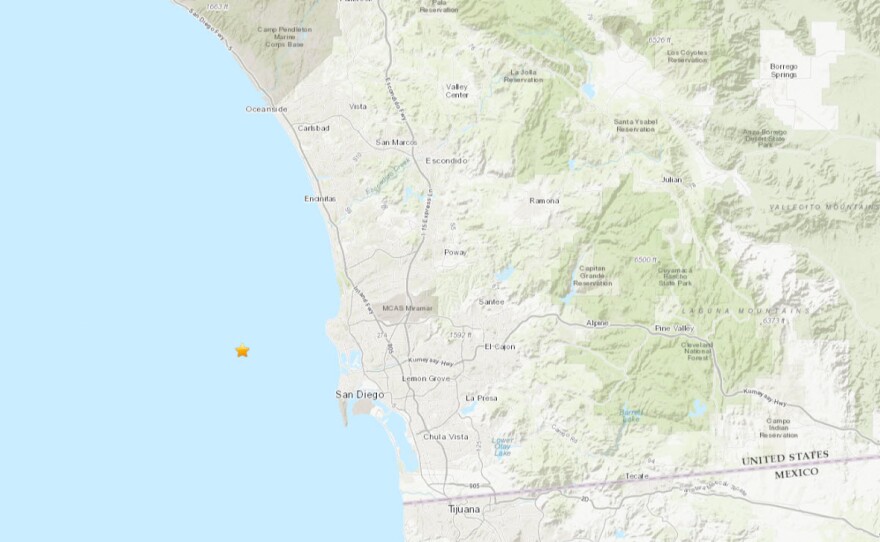An earthquake with a magnitude of 3 struck about 11.5 miles west of La Jolla, according to the U.S. Geological Survey (USGS).
The quake's location — as seen on the map above — is in the Pacific Ocean.
USGS recorded the quake hitting at 1:09 p.m.
There were no reports of any damage or public threats related to the quake.
The findings recorded still need to be reviewed by a scientist, according to the USGS site.
If you felt the quake, you can report it to USGS. The survey asks for other details like whether or not you were in a building when the shaking was felt.
If you ever experience an earthquake, you can follow the tips below for safety precautions.
What to do after an earthquake
- Expect aftershocks. These secondary shockwaves are usually less violent than the main quake but can be strong enough to do additional damage to weakened structures and can occur in the first hours, days, weeks, or even months after the quake.
- Listen to a battery-operated radio or television. Listen for the latest emergency information.
- Use the telephone only for emergency calls.
- Open cabinets cautiously. Beware of objects that can fall off shelves.
- Stay away from damaged areas. Stay away unless your assistance has been specifically requested by police, fire, or relief organizations. Return home only when authorities say it is safe.
- Be aware of possible tsunamis if you live in coastal areas. These are also known as seismic sea waves (mistakenly called "tidal waves"). When local authorities issue a tsunami warning, assume that a series of dangerous waves is on the way. Stay away from the beach.
- Help injured or trapped persons. Remember to help your neighbors who may require special assistance such as infants, the elderly, and people with disabilities. Give first aid where appropriate. Do not move seriously injured persons unless they are in immediate danger of further injury. Call for help.
- Clean up spilled medicines, bleaches, gasoline or other flammable liquids immediately. Leave the area if you smell gas or fumes from other chemicals.
- Inspect the entire length of chimneys for damage. Unnoticed damage could lead to a fire.
- Inspect utilities:
- Check for gas leaks. If you smell gas or hear blowing or hissing noise, open a window and quickly leave the building. Turn off the gas at the outside main valve if you can and call the gas company from a neighbor's home. If you turn off the gas for any reason, it must be turned back on by a professional.
- Look for electrical system damage. If you see sparks or broken or frayed wires, or if you smell hot insulation, turn off the electricity at the main fuse box or circuit breaker. If you have to step in water to get to the fuse box or circuit breaker, call an electrician first for advice.
- Check for sewage and water lines damage. If you suspect sewage lines are damaged, avoid using the toilets and call a plumber. If water pipes are damaged, contact the water company and avoid using water from the tap. You can obtain safe water by melting ice cubes.







